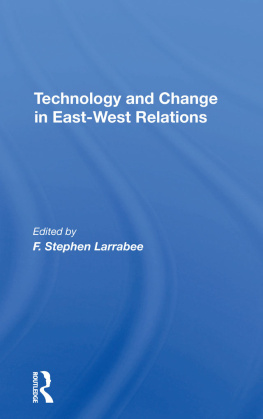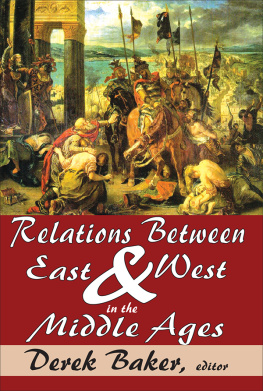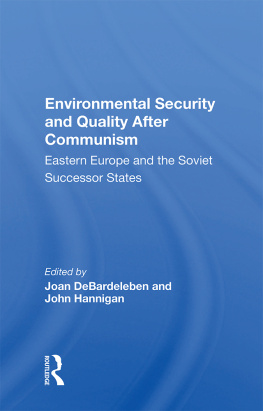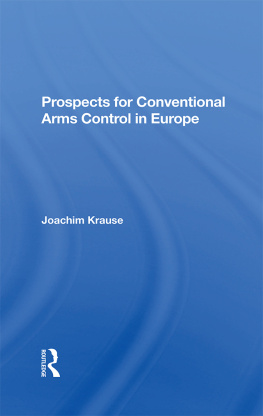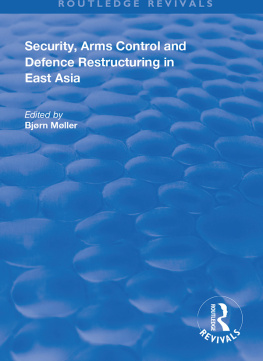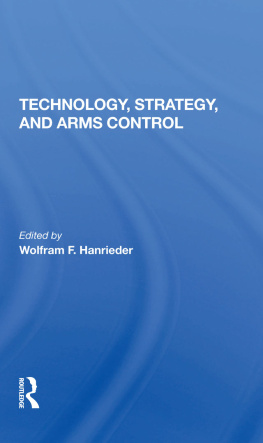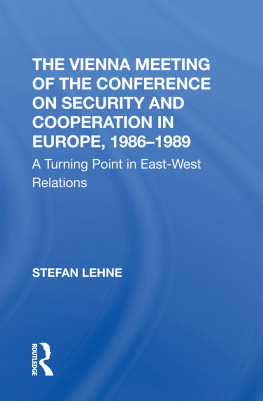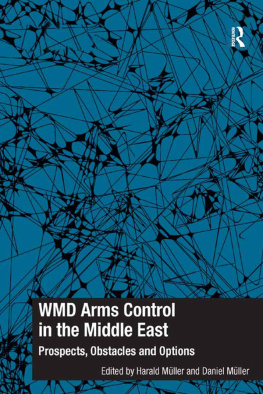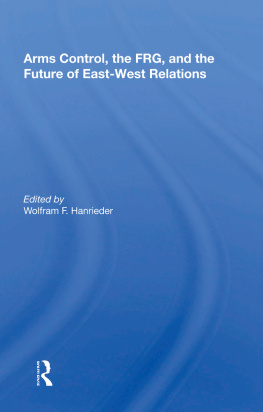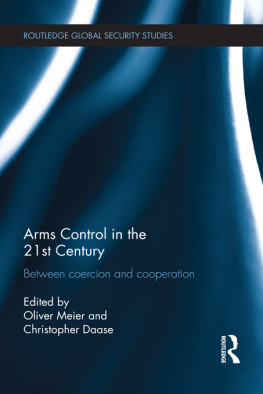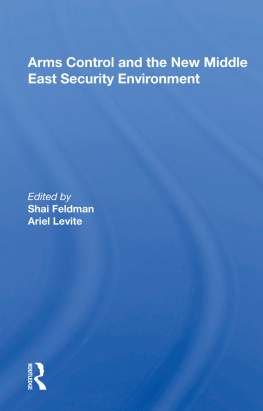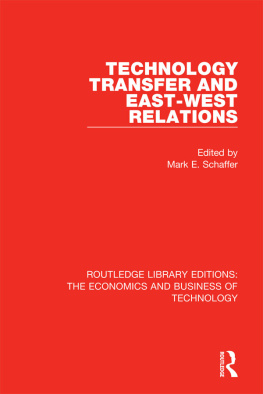East-West Monograph Series 6
Technology and Change in East-West Relations
edited by F . Stephen Larrabee
First published 1988 by Westview Press, Inc.
Published 2019 by Routledge
52 Vanderbilt Avenue, New York, NY 10017
2 Park Square, Milton Park, Abingdon, Oxon OX14 4RN
Routledge is an imprint of the Taylor & Francis Group, an informa business
Copyright 1988 by the Institute for East-West Security Studies, Inc., New York.
All rights reserved. No part of this book may be reprinted or reproduced or utilised in any form or by any electronic, mechanical, or other means, now known or hereafter invented, including photocopying and recording, or in any information storage or retrieval system, without permission in writing from the publishers.
Notice:
Product or corporate names may be trademarks or registered trademarks, and are used only for identification and explanation without intent to infringe.
Library of Congress Cataloging-in-Publication Data
Technology and change in East-West relations.
(East-West monograph series; 6)
Includes bibliographies.
1. East-West trade (1945- ) 2. Communist countriesForeign economic relations. 3. Technological innovationsInternational cooperation. 4. Technology transfer. I. Larrabee, F. Stephen. II. Series.
HF4050.T43 1988 337'.09171'7 88-32829
ISBN 13: 978-0-367-28963-8 (hbk)
Table of Contents
F. Stephen Larrabee and Mary Albon
Eugene Skolnikoff
Jerzy Wiatr
Joseph S. Nye, Jr.
Andrzej Karkoszka
Joachim Krause
Marek Thee
Michael Kaser
Jozsef Bognar
Pekka Tarjanne and Mauri K. Elovainio
Konrad Seitz
Thomas W. Simons
Guide
The challenges to international stability and security and the opportunities for international cooperation presented by rapid advances in science and technology during the postwar period are of increasing concern to both East and West. Technology has brought us both good and ill. Its increasingly rapid development and application have radically altered the living standards and expectations of populations worldwide. At the very time when the superpowers are liquidating their arsenals of intermediate-range forces and appear poised to bring East-West relations to a new stage of cooperation, ballistic missile and nuclear technologies are proliferating to other countries. Technology has rendered global war more deadly, yet perhaps less likely. Mass communication and information technology has made it impossible for dictators left and right to imprison, torture or kill their countrymen without the news reaching the rest of the world, yet other developments in technology have introduced deadly new options for guerrilla groups and terrorists. Despite the fact that East and West often take different approaches to the issue of technology and its assimilation, concern over technology's adverse effectsmilitary, political, social, economic, ecologicalmay one day eclipse the primacy of the ideological struggle between the two social systems.
The impact of technology on the future of East-West relations was the subject of the Institute for East-West Security Studies Sixth Annual Conference held June 11 to 13, 1987, in Helsinki, Finland. Over 150 participants attended, including Nobel laureates, government officials, media representatives and specialists from twenty-four countries in both East and West. The Helsinki Conference was the first joint East-West assessment of the impact of current and future technology on our mutual security. It attempted to address the areas which would be most affected by technological advances: 1) East-West relations; 2) international trade, finance and economic development; 3) nuclear, conventional and chemical /biological weapons arms control and reductions; and 4) policy and society.
This volume is based on papers presented at the Helsinki Conference which address the crucial aspects of these issue areas. Contributors include eminent specialists from both East and West who evaluate the impact technology has already had on East-West relations and international stability, and attempt to anticipate the implications of rapid technological advances for the future. The changingand growingrole of technology in all facets of life is explored thoroughly and with great insight by our contributors. The authors' diverse backgrounds are reflected in their views, yet a broad consensus does develop in this book: technology, despite its potential for destructive use, can and should be employed to develop greater cooperation in all aspects of international relations. Responsible guidance and foresight are needed to keep technological policy on the track of increased cooperation and interdependence.
The Helsinki Conference was made possible through the generous support of the Finnish Ministry of Foreign Affairs, Nokia Oy, Neste, Wartsila and Rauma-Repola. Finnish banks including Kansallis-Osake-Pannki, Union Bank of Finland, Skopbank and the Savings Banks also supported the conference. The Ford Foundation generously sponsored the 1986-1987 Resident Fellowships of Andrzej Karkoszka (Poland) and Joachim Krause (FRG), who wrote their contributions to this volume while in residence in New York. The Institute gratefully acknowledges the support of the Ford Foundation for the publication of this book. I would like to thank Institute staff members F. Stephen Larrabee, Vice President and Director of Studies, the editor of the volume; Peter B. Kaufman, Publications Officer, who guided the essays through the process of publication; and especially Mary Albon, Program Officer, without whose skills this volume would not have been possible. Christina Lombardi assisted in the editing of the papers.
The Institute for East-West Security Studies is pleased to sponsor the publication of this East-West monograph as a contribution to discussions in East and West about technology and change.
John Edwin Mroz
President
Institute for East-West
Security Studies
New York
November 1988
F. STEPHEN LARRABEE MARY ALBON
The Global Nature of Technology
In the period since World War II, the world has witnessed an unprecedented, rapid expansion of technology and scientific innovation. The impact of this latest wave of the scientific-technological revolution has already been felt, in varying degrees, in every nation on Earth. Agriculture and manufacturing, communication and transport, education and access to informationeach of these areas has benefited from scientific innovations of the past few decades. Technological advances have improved the standard of living for millions. But at the same time, technology is an ambiguous, double-edged force; technological advances have also contributed to both the quantitative increase and the qualitative improvement of weapons of mass destruction, from the atomic bombs dropped on Hiroshima and Nagasaki to contemporary conventional arms and battlefield nuclear weapons. As such, high technology has a major impact on international security and stability.
In June 1987 in Helsinki, Finland, the Institute for East-West Security Studies gathered over 150 representatives of NATO, the Warsaw Pact and the neutral and nonaligned European nations for a unique discussion of "Technology and Change in East-West Relations" at its Sixth Annual Conference. This volume is based on a series of papers delivered at the conference by specialists from the United States and both Eastern and Western Europe. Technology and its implications for international security are global issues that affect the two blocs and all other nations. In presenting views from both East and West, as well as those outside of, yet affected by, the East-West relationship, this book continues the Institute's goal of fostering a substantive East-West dialogue on crucial issues of security.


